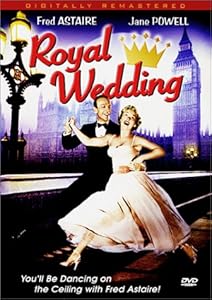 Cover of Royal WeddingLet's be clear about this: I have not been one of those obsessed with the Royal Wedding over the past few weeks, on either side of the argument. Like most people (at least, I hope like most people), I have found it exceedingly difficult to care in the least either way. Despite the news media's endless attempts to make this overwhelmingly non-event the major focus of every conceivable news cycle, I have remained blissfully unaware of much of the details, include the actual date of the event.
Cover of Royal WeddingLet's be clear about this: I have not been one of those obsessed with the Royal Wedding over the past few weeks, on either side of the argument. Like most people (at least, I hope like most people), I have found it exceedingly difficult to care in the least either way. Despite the news media's endless attempts to make this overwhelmingly non-event the major focus of every conceivable news cycle, I have remained blissfully unaware of much of the details, include the actual date of the event.But then, this morning, I stumble downstairs and find my way to the coffee pot blocked by widescreen coverage of Will and Kate (wasn't that a sitcom?) riding around massive groups of spectators in a horse drawn carriage while Joe Scarborough and Mika Whatever whore themselves out with some of the most inane and pointless voice-over news commentary imaginable. "Every shot you see, every camera angle, has been specifically planned out far in advance." What's this you say? A wedding ceremony that was planned in advance? I am shocked, shocked I say, to find out that some sort of preparation was involved in a wedding that was being hyped as a major media event months in advance. Listening to these simpering pseudo-journalists strain themselves to fill the dead air behind endless footage of a boring carriage ride, even for the five minutes it took me to get my coffee and toast, was mind-numbing to say the least.
So now I'm pissed. Not at pointless news coverage; I'd have to be dense to expect anything actually newsworthy on a Friday Morning Show. But suddenly this whole concept of the Royal Wedding being an event to celebrate and feel all warm and squishy about inside fills me with contempt. Between America, still dealing with prolonged unemployment and an increasing income gap between the wealthy and working class as corporations continue to rake in record profits during the ongoing recession, and Britain, with its populace facing yet another round of severe Austerity Measures, you would think the idea of sitting around watching disgustingly rich people showing off with an extravagant elitist wedding would be met with a bit more resistance.
I can't blame the rich people too much. They are notoriously out of touch to begin with. Throw a rock (and be sure you throw it hard) and you'll hit some rich prick so lost in their own wealth that they can't even begin to comprehend the problems and concerns of ordinary people, let alone understand why they get so upset when their financial concerns are dismissed as trivial, or complain about paying taxes when they are currently paying the lowest tax rates in decades. Actually, I take it back. I can blame them.
But stupid, arrogant rich bastards aside, I would like to think that our news media would have just a tad more respect for their viewing audiences than what they are currently displaying. I'd like to think that I could turn on the news today just in time to hear an announcer say "In other news today, the offspring of an antiquated form of governmental rule held a lavish wedding ceremony in the face of worldwide economic woes. We would cut to video and show you more, but frankly this sort of pointless extravagance is a waste of time and effort to even assemble, let alone cover, so we're going to give you more coverage about government officials attempting to eradicate labor laws specifically designed to protect the working class, followed by advertisements for luxury vehicles and gold speculation."
That's what I'd like to believe is possible, that is at least an option considered by someone, somewhere within what was once an essential watchdog in service to the people. But then I look back at the weeks of news coverage of Donald Trump, and the endless hours spent by newscasters and commentators discussing Trump's actions and decelerations as if he wasn't a slightly retarded imbecile with enough business smarts to keep him solvent and out of jail, and realize that when it comes right down to it, the media would rather run around documenting the inane and ineffectual lives of stupid rich people instead of reporting anything substantial and meaningful. Because, after all, where are the advertising dollars in something like that? They're just giving us what the public wants, and since people are still tuning in, they seem to be right. I'm watching stupid rich doing back-flips for media attention because that's what my fellow working-class citizens want to see.
This is not a good way to start the weekend.







